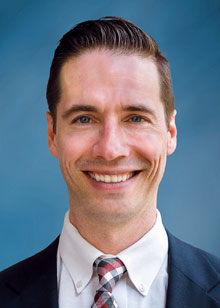Convocation To Combine Touch of Broadway With Role of Music in Mental Health
Abstract
This year’s Convocation of Distinguished Fellows will give attendees a taste of the Great White Way featuring a Broadway performer-turned-psychiatrist.
The lights of Broadway will dazzle attendees of this year’s Convocation of Distinguished Fellows on Monday, May 6: The evening will feature a special musical experience with Broadway performers, kicked off by Broadway-performer-turned-psychiatrist Clark Johnsen, D.O.

Clark Johnsen, D.O., will moderate a question-and-answer session after the Broadway performance at the Convocation, exploring the impact of music on mental health.
The event will examine stories of mental health through the lens of musical theater with the help of four Broadway singers who will each perform a number from an award-winning show. “Dear Evan Hansen,” “Next to Normal,” “Jagged Little Pill,” and “Spring Awakening” will be featured. They delve into topics such as anxiety, bipolar disorder, opioid use, taking medication, gender dysphoria, and even the aftermath of suicide.
“These shows’ core stories center on mental health and how you overcome these obstacles, how you live with them, and how family and the people around you can support you through them,” producer Marc Tuminelli, executive director and owner-founder of Broadway Events, told Psychiatric News.
Tuminelli explained that in the past 15 years of musical theater, there’s been a shift to exploring more complex themes of mental health. “Through musical theater, you can convey what’s going on in your inner story, in your heart and soul. In song, you can relay those profound emotions that you couldn’t otherwise share in a scene,” he said.
Such shows have a profound impact on those who see them. “Performers at these shows all describe audience members who waited for them at the stage door and said, ‘Because of this show, I felt like I had a voice’ or ‘I felt like someone understood what was going on in my head for the first time.’ ”
Johnsen, a private practice psychiatrist-psychotherapist in New York City and a clinical assistant professor of psychiatry at Weill-Cornell and a second-year candidate at the Columbia Psychoanalytic Institute, will moderate a question-and-answer session following the performance, exploring the impact of music on mental health. Johnsen is uniquely qualified to serve as moderator: Prior to becoming a psychiatrist, he spent a dozen years in the star-studded life of a Broadway performer. In fact, he once performed in the original cast of “The Addams Family” and nationally touring productions of “Mary Poppins,” “Mamma Mia,” “42nd Street,” and “High School Musical.”
As a child, Johnsen was one of seven siblings raised in a strict Mormon family, including a two-year-stint as a missionary. One of the highlights of his Broadway career was performing with the original cast of “The Book of Mormon” for more than two years.
“It’s an incredibly rare thing in the life of a performer, or probably in any career path, to do something as deeply personal to one’s lived experience, to the central conflicts of one’s life, as ‘Book of Mormon’ was for me,” Johnsen told Psychiatric News. “It was incredibly meaningful to tell the story of the value of faith and community that does not hinge on that faith being true. ... I think “Book of Mormon” highlights the ridiculousness of certain beliefs, but still makes a point of showing how they can bring meaning to people and bring people together.”
It was Johnsen’s experience working as a Mormon missionary at age 19, helping the medically underserved in remote Sinaloa, Mexico, that lit the spark that led him to attend medical school. Working with American physicians, Johnsen said he “learned how to step out of myself and care more about others. I learned to forget my problems and focus on others’ needs. That was a very powerful experience.”
It was a painful decision for Johnsen to ultimately leave the Mormon church. “I left the faith because … the church does not have a legitimate space of belonging for LGBTQ people such as myself. For years I had known this but rationalized it away. I believed it was my cross to bear to be excluded, misunderstood, and marginalized. Eventually, I realized that I shouldn’t have to change or alter my sexual orientation to see myself as a valuable human being.”
Johnsen said that being a performer gave him a sense of curiosity and openness about inner life that he draws upon now in his work with patients. “As an actor, singer, and dancer, you are always thinking about the nexus of the mind and the body. With each note you sing or each step you dance, you are bringing together what is at once mental, physical, creative, destructive, loving, hating. ... There is such an inherent dialectic in the experience of musical theater—you have to acknowledge all sides of something to create it. Psychiatrists, too, think in that complex, dialectical, and dimensional way.”
Johnsen has some advice for people who might be thinking about medical school and becoming a psychiatrist. “Psychiatry is one of the most hospitable areas of medicine for nontraditional students or, as I liked to call myself in residency, ‘geriatric residents’ such as myself,” he said.
Ultimately, he said “if you know something is for you, you will not quit until you make it happen. The more determination and sacrifice something requires, the more richness and appreciation it yields once you achieve it.”
The Convocation recognizes APA members who have been awarded the designations of Distinguished Fellow, Distinguished Life Fellow, International Distinguished Fellow, Fellow, International Fellow, and Life Fellow of APA as of January 1. The new class of 50-year Life Members will also be honored at the event for their commitment to APA, and the 2024 award recipients will be announced. ■
The Convocation of Distinguished Fellows will be held Monday, May 6, 5:30 p.m. to 6:30 p.m. in the Javits Center.



